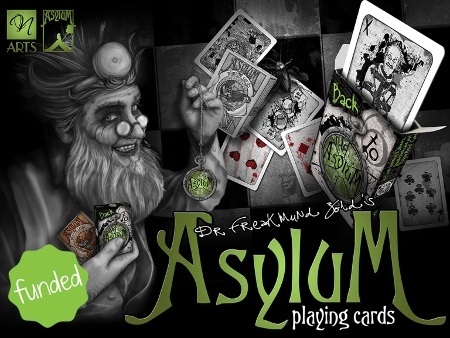A Seattle court has ordered Altius Management, the creator of the Asylum Playing Cards Kickstarter, and co-defendant Edward J. Polchlopek (AKA Ed Nash) to pay over $54,000 in restitution, penalties, and costs in a case brought by the Attorney General of Washington last year (see "Washington AG Charges Kickstarter Fraud"). The defendants did not appear and judgment was by default, with no attorney for the defense listed on the court order.
Even as the court was publishing its order late last month, backers were posting in the project’s comment section that they were beginning to receive the promised playing cards.
The suit was filed under the state’s Consumer Protection Act on behalf of backers in the state of Washington who did not receive the products promised in the Kickstarter. The company stopped communicating with backers in 2013.
There were 31 Washington backers, who were awarded $668 in restitution for their contributions to the project. The state was awarded $31,000 in penalties ($1,000 per backer), and $23,183 for the costs and fees of the case.
The court also enjoined the defendants against running crowdfunding campaigns, participating in misrepresentations related to crowdfunding or online commerce, or violating provisions of the state’s Consumer Protection Act.
This was the first case of its kind (crowdfunding failure) in the U.S.
Meanwhile, on July 24, Adam Green posted on the Kickstarter project, "Weird I just received a package from Ed Nash containing my reward, not that I care anymore." His post was followed by similar posts by others over the following weeks from locations across the U.S. and around the world. While there are still some posts from as recently as a few days ago from backers who had not yet received their cards, it appears that an effort is being made to complete the shipping of the promised goods to the Kickstarter backers.
Where does that leave the court order? It was dated July 22, and presumably will remain in force even if all Washington backers receive their promised goods. But whether the money is collected may be another matter. Regardless, the court case is an important precedent, and it may be that the project’s creators’ shipment of the promised goods is another kind of precedent—one that shows it may take a long time and government help before some projects are shipped.

As Shipments of Kickstarted Products Begin
Posted by Milton Griepp on August 18, 2015 @ 2:10 am CT



